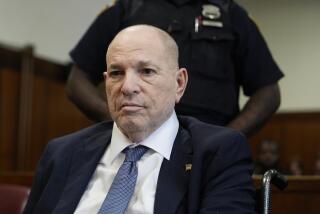Aspin’s Prognosis Is Good After Pacemaker Surgery : Cabinet: Doctors say the operation was a success and that the defense secretary should be back at work next week.
- Share via
WASHINGTON — Defense Secretary Les Aspin received a pacemaker implant Thursday to prevent further deterioration of his heart. His physicians declared the operation a success and said he probably would be back at work early next week.
The relatively simple 90-minute procedure was performed using a local anesthetic and a mild sedative. Aspin, 54, was fully conscious as the silver-dollar-sized device was implanted just below his collarbone, with twin wires leading to his heart.
Although Aspin’s cardiologists conceded that he was suffering from “a serious underlying condition,” they said they expect the pacemaker to strengthen his heart and alleviate the coughing and breathlessness that have plagued him in recent weeks.
Aspin’s condition has been diagnosed as hypertrophic cardiomyopathy, or enlargement of the heart muscle, which blocks the flow of blood pumped from the heart.
The pacemaker, a so-called “dual-chamber” device, is designed to make Aspin’s heart contract less vigorously rather than to regulate the rhythm of the beat, doctors said.
The use of a pacemaker to treat the condition is relatively new and little is known about its effectiveness over a long period, but his physicians said they are optimistic.
Aspin is scheduled to remain in the hospital for another day or two so doctors can monitor his progress and finish treating him for possible bronchitis. He has been asked to reduce his workload and avoid overseas travel for at least a week.
While doctors insisted that Aspin’s illness is far from life-threatening, the latest episode is his second trip to the hospital for heart trouble in three weeks, raising questions about how long he will be able to continue in his post.
Physicians said Aspin emerged from the procedure in good spirits and that the heart murmur he had when he entered the hospital on Tuesday had diminished as a result of the operation.
But they said the real impact of the surgery probably would not be felt for several weeks.
At the same time, they conceded that they could not rule out the possibility that Aspin might someday require open-heart surgery, the next step in treating such a condition.
Controlling the Heartbeat
Pacemakers are usually used to keep the heart from beating too slowly. In Les Aspin’s case, doctor’s are using the device to ease the intensity of the heartbeat, which would improve circulation through the chambers.
ABOUT THE SURGERY Length: 90 minutes Anestetic: Local Recovery time: 24 to 48 hours, but full benefits of the surgery may not be felt for several weeks. Next step: If the pacemaker doesn’t solve the problems, the next move would be open-heart surgery. Sources: Times Washington Bureau
More to Read
Sign up for Essential California
The most important California stories and recommendations in your inbox every morning.
You may occasionally receive promotional content from the Los Angeles Times.













